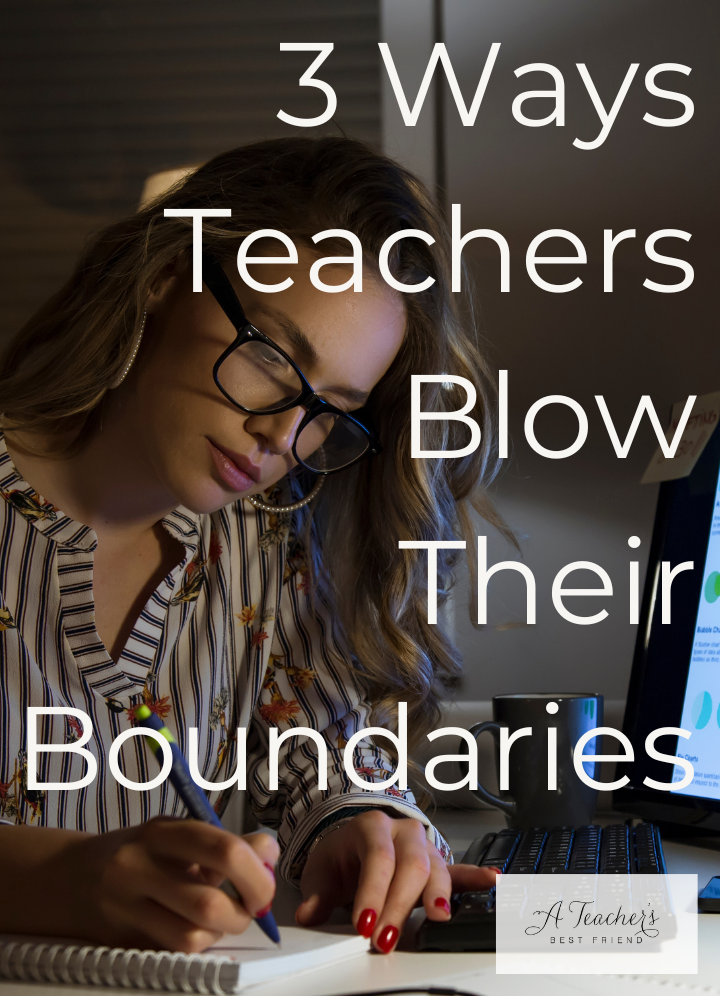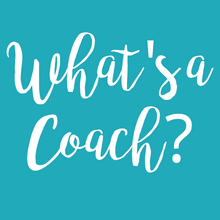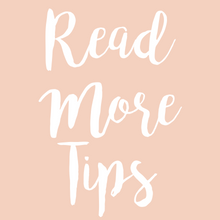
It takes one to know one… I was a teacher with ZERO boundaries. And now I have coached dozens of teachers who suffer like I did. These 3 ways teachers blow their boundaries are maybe some of the most common things that drive teachers to burnout. Let’s normalize what’s difficult here but acknowledge – there are HUGE consequences personally and professionally when we blow our boundaries.
What’s the big deal about boundaries?
The word “boundaries” has almost become like “self-care” – something we cringe at hearing because it feels like yet another (important) thing we don’t have time to do. So let me just put you at ease here:
- setting boundaries actually can be quite simple and easy so it doesn’t feel like one more thing on your plate
- having boundaries will SAVE you time
- setting boundaries can help you find time for YOU … and even self-care if you want 😉
Boundaries create:
- more peace
- less drama
- a sense of control
- stronger relationships
Sounds pretty awesome, right?
Okay, but here is where we go wrong. Check out these 3 ways teachers blow their boundaries:
Saying ‘Yes’ When We Mean ‘No’
Attribute it to the fast pace we’re going or the fact that we are wired as teachers to put others’ needs before our own, but whatever the reason, we often find ourselves saying ‘yes’ when what’s right is to say ‘no’.
What’s up with that?
For most of the teachers I work with, they genuinely WANT to be involved in all the things they say ‘yes’ to. We just tend to believe we have more time, energy, and capacity than we really do. I think it’s because we freakin’ crush it everyday and we know that, in our hands, that project/event/committee would be amazing.
I think it’s also because we care SO deeply, and all the things we engage with are incredibly important. Teaching is a service profession. We serve deserving individuals, and it’s incredibly difficult to stomach not doing everything we physically, emotionally, and energetically can to serve them well.
We forget that we also are incredibly deserving of peace, happiness, and a well-balanced life.
Typically, this phenomenon of saying ‘yes’ when what’s best is to say ‘no’ is due to the fact that it’s just plain easier to say ‘yes’. We don’t take the time for the discernment the decision requires in the moment. We move at the speed of light from the moment our feet hit the floor until the moment we drop back into bed.
Let’s face it…saying ‘yes’ is easier than making waves, delegating, or seeing something important flounder.
Work Takes Over Our Personal Lives
The most nefarious of all the ways teachers blow their boundaries is letting work creep into their personal life either through taking work home, working on weekends, or just thinking about work when you want to be present with friends and family.
What’s up with that?
Well firstly, all the work feels urgent and important! Again to the moving-at-the-speed-of-light point, we often don’t feel we can stop and invest the time in prioritizing and delegating. Also, where do we draw the line when we know there will be 30+ or 100+ students staring at us blankly the next day if we don’t get this done?
Also, can we acknowledge the elephant in the room?… Administration’s Expectations.
It seems that now, more than ever, admin/district expectations to “make up” the learning losses from the pandemic are off the charts. At some level, we get it. These kids need a lot right now. But on the other hand, we are human beings and though we work miracles every single day without acknowledgement, we are ONE-PIECE of a much bigger puzzle that involves many support services, interventions, and parent involvement to address the needs of these students.
And then there’s the fact that we have very high expectations of ourselves. Almost every teacher I’ve ever met or worked with has incredibly high expectations of themselves. And that can lead to us blowing our boundaries in services of our expectations.
The question we all need to answer is: how do we keep our high expectations and still have a personal life?
People Pleasing
Again…it takes one to know one. I’m a people pleaser. And trying to please everyone else made me blow my boundaries DAILY before I started my own journey toward healthy boundaries.
What’s up with that?
As teachers, we care about people – it’s in our DNA. So the specter of doing something that someone else finds off-putting, inconvenient, or awkward is one we try to avoid at all costs…including costs to ourselves.
Here are some examples of people pleasing:
- Stepping up to volunteer when no one else does
- Being an “ear” for someone who has a lot of problems
- Doing things (unwillingly) that aren’t your responsibility
- Doing more just because you’ve been there longer than others
- Letting people use your time and energy
- Listening to colleagues’ negativity even after it’s no longer productive
- Agreeing with gossip even when it doesn’t feel right
These are all ways that we are prioritizing the relationship over what’s best for us. And in reality, these things actually HURT the relationships we are trying to maintain. Not to mention, always putting our own needs last makes us bitter and cranky – who wants to be around that?
But there is hope…
If you read these paragraphs and thought, “ouch! that’s me!”, don’t fear… there are teachers who have learned to set healthy boundaries that don’t compromise their expectations for professional excellence.
Focusing your energy on even ONE healthy boundary that you want to create can make a tremendous difference!
What is one boundary that you’d like to put into place to support your wellbeing and resilience?
Whether it’s not taking work home at the end of the day, only working one hour on the weekend, saying ‘no’ more often, or going to bed at a decent time each night, one positive step can lead to other positive steps which gradually lead to sustainability as a teacher.
You can’t get to resilience and sustainability in teaching without some boundaries. But if this is an area of weakness for you, I have some resources for you!!
Setting Healthy Boundaries for Teachers E-Course
I’m so excited to announce that I JUST released a new e-course to support you in developing healthy boundaries as a teacher. I specifically go through these boundary “busters” in detail and give you ideas for how to begin shifting each of these areas AND MORE!
Setting healthy boundaries can be the first step in supporting your wellbeing.
You do so much.
Do something for yourself now.
Here for you and for the journey,
Alison



As educators, it is also important that they maintain boundaries with themselves and their students. This is also a way of taking care of their well-being.